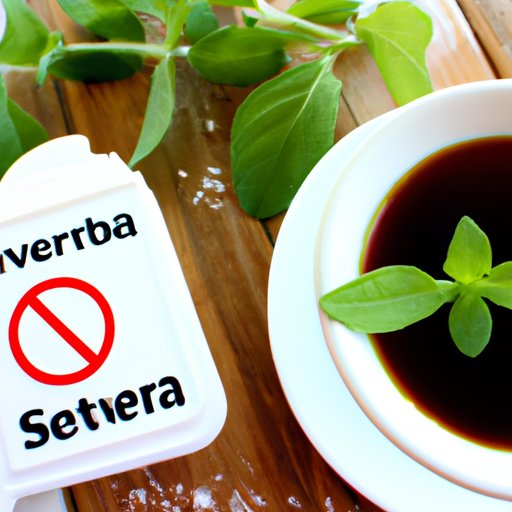Introduction
Stevia is a natural sweetener derived from the leaves of the stevia plant that has become increasingly popular in recent years. It is about 200-300 times sweeter than regular table sugar and is often used as a sugar substitute in food and beverages. In this article, we will explore the health benefits and risks of stevia, its nutritional profile, and whether or not it is a safe sugar substitute.

A Review of the Health Benefits and Risks of Stevia
When it comes to examining the health benefits and risks of stevia, there is a lack of research in this area. However, some studies suggest that there may be some potential benefits. For example, one study published in the Journal of Medicinal Food found that stevia may help to reduce blood pressure and cholesterol levels, two risk factors for heart disease.
In addition, another study published in the International Journal of Food Sciences and Nutrition found that stevia may have anti-inflammatory and antioxidant properties. These properties could potentially help to protect against various chronic diseases, such as diabetes and cancer.
While there are some potential health benefits associated with stevia, there are also some possible risks. One study published in the Journal of Toxicology and Environmental Health found that consuming large amounts of stevia may cause reproductive problems in rats. Another study published in the same journal found that stevia may have an estrogenic effect, which could potentially increase the risk of certain cancers.
Exploring the Nutritional Profile of Stevia
When it comes to the nutritional profile of stevia, it is relatively low in calories and carbohydrates. According to the United States Department of Agriculture (USDA), one teaspoon of stevia contains just four calories and one gram of carbohydrates. This makes it a suitable alternative to regular table sugar for those who are watching their calorie or carbohydrate intake.
In terms of micronutrients, stevia does contain small amounts of certain vitamins and minerals, such as vitamin C, magnesium, and potassium. However, these amounts are generally too small to be considered nutritionally significant.
Is Stevia a Safe Sugar Substitute?
When it comes to using stevia as a sugar substitute, it is important to consider how it affects blood sugar levels and insulin levels. According to a study published in the British Journal of Nutrition, consuming stevia does not appear to have any effect on blood sugar levels. This suggests that it may be a safe alternative to regular table sugar for those with diabetes or pre-diabetes.
In addition, another study published in the Nutrition & Metabolism found that consuming stevia does not appear to have any effect on insulin levels. This suggests that it may be a safe alternative for those who need to control their insulin levels.

Comparing Stevia to Other Natural Sweeteners
When it comes to comparing stevia to other natural sweeteners, it is important to consider the nutritional profile of each sweetener. For example, honey and agave nectar both contain more calories and carbohydrates than stevia. On the other hand, maple syrup and coconut sugar both contain fewer calories and carbohydrates than stevia.
In terms of micronutrients, all of these natural sweeteners contain small amounts of certain vitamins and minerals. However, the nutrient content of each sweetener can vary depending on the variety and source.

The Pros and Cons of Using Stevia as a Sweetener
When it comes to the pros and cons of using stevia as a sweetener, there are several factors to consider. On the plus side, stevia is a natural sweetener that is low in calories and carbohydrates. It also does not appear to have any effect on blood sugar levels or insulin levels. This makes it a suitable alternative for those with diabetes or pre-diabetes.
On the other hand, there are some potential risks associated with stevia. While there is not enough research to conclusively determine if these risks are real, it is important to be aware of them. In addition, stevia does not contain any significant amount of nutrients, so it should not be relied upon as a source of essential vitamins and minerals.
Conclusion
In conclusion, stevia is a natural sweetener that is low in calories and carbohydrates and appears to be safe for those with diabetes or pre-diabetes. However, there are some potential risks associated with stevia and it does not contain any significant amount of nutrients. As such, it is best to use it in moderation and to pair it with other sources of essential vitamins and minerals.
Overall, stevia can be a useful sugar substitute for those looking to reduce their intake of regular table sugar. However, it is important to be aware of the potential health benefits and risks associated with this natural sweetener and to use it in moderation.
(Note: Is this article not meeting your expectations? Do you have knowledge or insights to share? Unlock new opportunities and expand your reach by joining our authors team. Click Registration to join us and share your expertise with our readers.)
